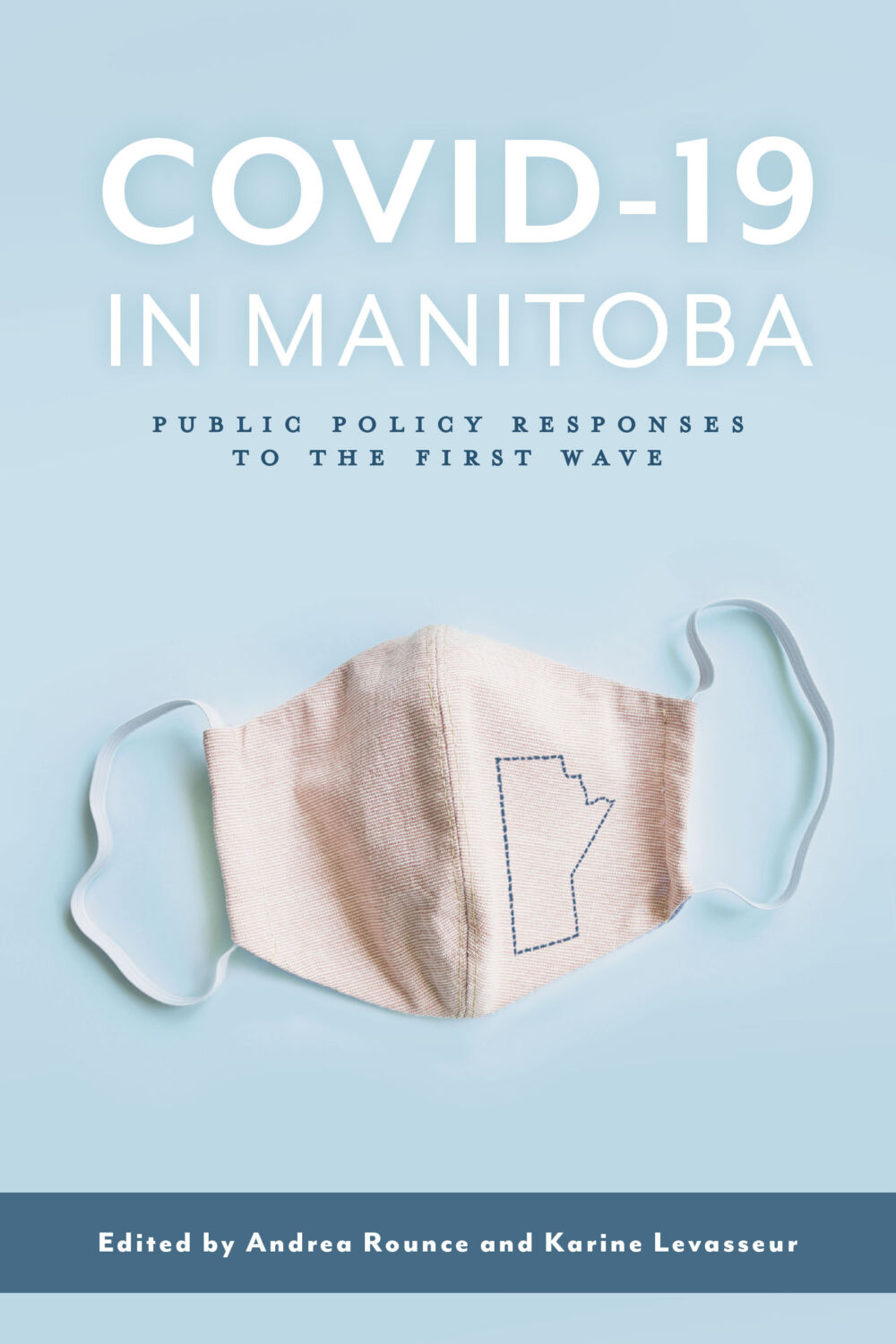- December 1, 2020
- 7:00pm – 8:30pm CST
- Online Event
Please join us for the virtual launch of COVID-19 in Manitoba: Public Policy Responses to the First Wave.

Editors Andrea Rounce and Karine Levasseur will be joined by contributors Laura Funk, Fletcher Baragar, Josée Lavoie, Stewart Hill, Shirley Thompson, and Julie Guard..
Register in advance here: https://us02web.zoom.us/webinar/register/1916055656904/WN_EOCKPRvoTn6KTUpkY_DJdA
Download the book here: http://uofmpress.ca/covid-19-in-mb
Send questions or comments to: [email protected].
This event is being sponsored by the University of Manitoba’s Institute for the Humanities.
About the Book
On 12 March 2020 Manitoba confirmed its first case of COVID-19. One week later, it declared a province-wide state of emergency, ushering in a new sense of urgency and rarely used government powers to protect Manitobans from the devastating global reach of the novel coronavirus. More than six months later, after lifting restrictions over a summer with relatively few cases, Manitoba shattered daily case records.
The wide-ranging impacts of the pandemic have touched every facet of Manitoba society and provincial responsibility, including health, economic development, social services, and government operations. COVID-19 has challenged the conventional policy-making process––complicating agenda setting and policy formulation, adoption, implementation, and evaluation. At the same time, governments have been under pressure to make swift decisions in life-and-death matters. New programs must address urgent and shifting health and economic realities, but also anticipate future waves of COVID-19 and potentially significant repercussions for future governments.

COVID-19 in Manitoba: Public Policy Responses to the First Wave seeks to understand how Manitoba fared during the first months of the pandemic, with twenty-seven chapters that address key aspects of the pandemic and discuss how government policy can help lay the foundation for resiliency in the midst a continuing public-health crisis. This open-access volume identifies policy gaps and successes of Manitoba’s early COVID-19 response to inform efforts to prepare for and curb oncoming waves of infection. As the province contends with hundreds of new cases daily, hospitals near capacity, and our communities enter “code red” status, this book is a timely and essential resource for citizens and policy-makers alike.
About the Presenters
Dr. Laura Funk is a sociologist at the University of Manitoba with expertise in social aspects of care work, death/dying and aging. In her research, Dr. Funk uses qualitative methods and sociological theories to examine paid and unpaid care in different settings.
Fletcher Baragar is an Associate Professor in the Department of Economics University of Manitoba. His interests and areas of specialization include Marxian economics and the history of economic thought, and macroeconomics.

Dr. Josée Lavoie is a Professor with the Department of Community Health Sciences, Faculty of Health Sciences and Director of Ongomiizwin Research at the University of Manitoba. Before beginning her research career, Josée spent 10 years working for Indigenous controlled health services in Nunavut and Northern Saskatchewan.
Stewart Hill is a PhD candidate at the Natural Resources Institute, University of Manitoba, who is also working as a senior research and policy analyst at the Manitoba Keewatinowi Okimakanak (MKO), the Manitoba Northern Chiefs Organization. He is from northern Manitoba, where he was born and raised in God’s Lake First Nation, and is able to speak his Cree language fluently. His dissertation re-searches and asserts governance over land and water in the traditional territory of his home community of God’s Lake First Nation. The input and views shared in this article by Hill in no way reflects views or opin-ions of the MKO, but rather are the views, observations, and opinions of Stewart Hill as an academic PhD student of the University of Manitoba.
Shirley Thompson is an associate professor at the University of Manitoba, who teaches eco-health and environmental justice. Dr. Thompson is the principal investigator of the Mino Bimaadiziwin partnership, which builds capacity and houses in northern Manitoba through partnerships for community-led post-secondary education in Garden Hill and Wasagamack First Nations. An Indigenous Food Sovereignty program for Brokenhead First Nation, planned to start in May 2020, was delayed due to COVID-19.
Julie Guard teaches History and Labour Studies at the University of Manitoba. Her recent books are Radical Housewives: Price Wars and Food Politics in Mid-Twentieth Century Canada (UTP) and Bankruptcies and Bailouts (Fernwood). She researches social movements, women’s, labour and left history, social movements, and contemporary union struggles, and has published in a number of international journals.
Andrea Rounce is an Associate Professor in the Department of Political Studies at the University of Manitoba.
Karine Levasseur is an Associate Professor in the Department of Political Studies at the University of Manitoba.
About the Institute for the Humanities
The University of Manitoba Institute for the Humanities (UMIH) was established in 1990 to foster research and scholarship in the Humanities at the University of Manitoba, to promote cross-disciplinary research in the Humanities, and to help obtain external funding for Humanities research.
The Institute addresses the needs and interests of researchers in a broad range of subject including literature and languages, film and visual culture, philosophy, history and religion, and also the literary, philosophical, theological and historical aspects of the social and physical sciences, mathematics, the arts, and professional studies. It also supports an annual graduate fellowship worth up to $5000.
UMIH supports two or three research clusters and two or three research affiliates. The Institute is located within the Faculty of Arts but is intended to serve the entire Humanities constituency in the University and the general community. The Institute is accordingly committed to community outreach through programs and lecture series for the general public. UMIH is involved in various interdisciplinary, humanities-themed research initiatives.
For more information about the UMIH and its programming, please visit http://umanitoba.ca/faculties/arts/departments/humanities/ or follow us on Facebook.

